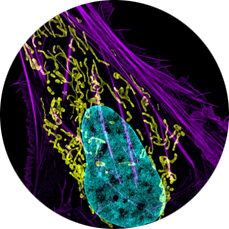 Matrix biology is central to the NICHD mission because it is intrinsic to the formation and reshaping of tissues before and after birth. The Bone & Matrix Biology in Development & Disease Affinity Group aims to elucidate the mechanisms by which primary gene—or sometimes acquired—defects cause skeletal fragility and other matrix abnormalities, and to apply this knowledge to the treatment of affected individuals throughout their entire life processes. This goal is pursued with a close relationship between basic, translational, and clinical science.
Matrix biology is central to the NICHD mission because it is intrinsic to the formation and reshaping of tissues before and after birth. The Bone & Matrix Biology in Development & Disease Affinity Group aims to elucidate the mechanisms by which primary gene—or sometimes acquired—defects cause skeletal fragility and other matrix abnormalities, and to apply this knowledge to the treatment of affected individuals throughout their entire life processes. This goal is pursued with a close relationship between basic, translational, and clinical science.
The current primary focus of the group is on translational studies of skeletal dysplasias and related bone disorders. We have identified and characterized molecular mechanisms of several novel skeletal development disorders in this spectrum. In addition to building on these successes and expanding our knowledge of mechanisms and pathology of skeletal development, we are developing novel approaches to therapeutic intervention, which will be translated to clinical trials. We are expanding our research to extracellular matrix (ECM) development and pathology in other tissues and organs. We also anticipate expanding our research program toward studies of ECM disorders in placenta, lungs, cartilage, growth plate, and other tissues and organs that are involved in fetal health, prematurity, and early child growth and development.
Labs within this group:
- Sergey Leikin [Head]
- Carlos Ferreira
- Catherine Gordon (secondary)

 BACK TO TOP
BACK TO TOP